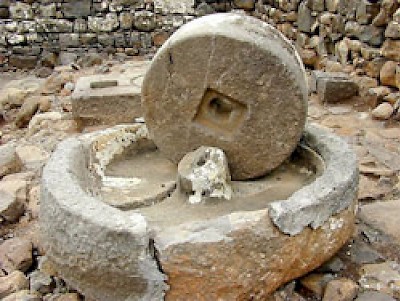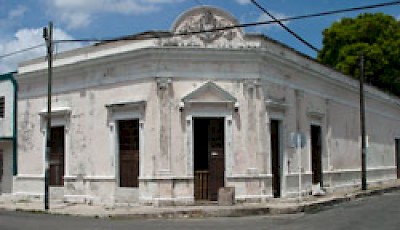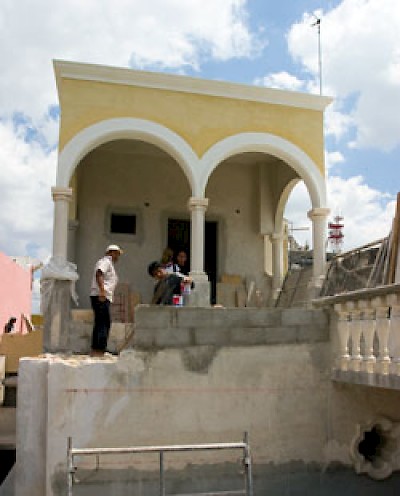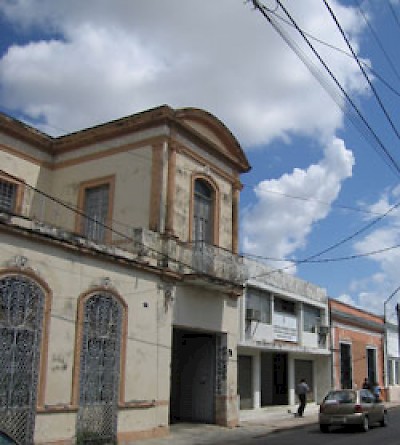Merida Real Estate Predictions
Predicting human behavior has been around since Thales simultaneously kicked off Western Philosophy, the scientific revolution, and earned the title as the world’s first true mathematician. Just what does one of the lesser-known Seven Sages of Greece have to do with future real estate values in the Yucatan? Thales loved to explain the world around him by replacing mythology and emotion with logical, scientific, and mathematical principles. Fortunately for us, Aristotle recounted the following tale of Thales, a story which involves olive presses and olive production in Chios and Miletus, giving us a glimpse of how logic and math can be used to peer into Yucatan's misty real estate future.
Thales and the Olive Presses
In part XI of Book One of Politics, Aristotle spins a yarn about a philosopher "who showed the world that philosophers can easily be rich if they like, but that their ambition is of another sort". Aristotle tells how one winter, Thales put a deposit on all the olive-presses in Chios and Miletus, which gave him exclusive use of the presses after the coming harvest.
>
Since the press owners weren't sure whether the harvest would be bountiful or a bust, Thales, secured the contracts for very low prices in what is thought of as the first known example of options trading. Aristotle also tells us that there was not one bid against him. The olive press owners believed that they were protecting themselves against a poor harvest, by guaranteeing at least some money up-front, regardless of how the harvest turned out. Good plan, eh? Go with the herd. There's safety in the herd.
So how did it turn out? An excellent harvest forced heavy demand for the presses. Since Thales held a monopoly, he rented them out at huge profits. Was he an expert olive crop forecaster? Not really. Rather, he deteremined that even a bad harvest would not lose him much from the lost deposits, while the potential profits of a good harvest far out-weighed the possibilities of small losses. Thus Thales showed the world that “philosophers can easily be rich if they like, but that their ambition is of another sort".
So what is Thales' lessons to us in the present moment? Facts, logic, and math are not just the tools of scientists and philosophers.
US Baby Boomer Demographics
For the past few years, many local expats have predicted only marginal real estate price gains here in the Yucatan, but a quick look at US demographics offers a different picture. We are fast approaching 2013, when the 1947-1948 US Baby Boomers reach official retirement age. 2013 is notable, because the number of people eligible for retirement will jump by about 10 million, from 15 million up to 25 million. This might seem like just boring facts. But if Thales were around today, he might make a different case. Here's where some simple bits of math come in.
Let's Do The Math
Since many of the eligible retirees will need to continue to work, maybe only 40% of the US Boomers will retire in 2013. Let’s say then that there will only be 10 million new retirees every year. Clearly, Mexico is not everyone's cup of tea, so maybe only 10% of those retirees will consider Mexico to stretch their retirement fixed incomes, yielding a paltry one million new retirees. Continuing on a Thalesian path, Merida is one of Mexico's top three cities for quality of living, and Merida and Yucatan's Gulf Coast offer safety, relatively low real estate prices, excellent health care, modern services, and even a growing expat population, so newcomers don't have to live like isolated pioneers. If only 5% of those one million consider visiting or living in Merida and Yucatan's Gulf Coast, that would mean roughly 50,000 new expats coming to north Yucatan every year. Are you starting to see the Thalesian opportunities?
The 25 million new Baby Boomers eligible for retirement every year will continue to drive a growing Grey Boom from 2013 to 2030. For the sake of argument, let's say these Thalesian guess-timates are high by a factor of ten. That still adds 5,000 new expats every year, swelling Yucatan's current (approximately) 10,000 expat population dramatically. In fact, that would add 50% more expats in 2013 alone. The more likely addition of 10,000 - 20,000 new expat visitor/buyers every year for the next seven to ten or more years would definitely change the Yucatan's economy and real estate opportunities. In fact, real estate in Yucatan might be similar to Arizona's & Colorado's 10X growth throughout the '70's, '80's, & '90's.
Where Will They Go?
Like Colorado's desirable mountain property, there is only so much beach property and only so much Merida Centro property. Like recent buyers, many of these new expats will fall in love with the romance of classic Spanish colonial architecture, driving the Centro market prices upward. Others will seek their beach front Shangri-La's on the Yucatan Gulf Coast.
A ten year torrent of five thousand new expats a year seems to belie some current predictions of marginal inflation of Merida and the Yucatan Gulf Coast’s real estate markets. Keeping it all in good Thalesian factual perspective, the local real estate market is coming off a few flat years for both sales and prices, which makes some people cautious, like their 600 BC olive-press-owner counterparts. These are the ones who are predicting real estate growth that only marginally keeps ahead of inflation.
Retirement Accounts
Which are you? If Thales were here today, would he argue that 25 million newly eligible retirees every year between 2013-2030 is tough to ignore, and quietly place his bets? Would he do this even though many of the potential retirees have less in their retirement accounts now due to the recent worldwide economic failure? Again, facts, logic, and math may ride to our rescue. Is it possible that the much heralded retirement portfolio losses are also ultimately a bit of a mirage?
A quick check of the major stock indexes shows recovery to their August 2008 pre-crash levels. If the current trends continue, the data show that investors will likely erase all their losses in just the next year, reaching pre-crash highs by early 2012. What does this mean for the north Yucatecan economy? If Boomers didn't panic-sell their investments, they should logically recover all of their portfolio losses before 2012.
A different logical scenario is that many people approaching retirement in 2012-2013 followed financial advisor's advice and shifted their portfolios heavily to bonds five years before retirement. This would mean that many conservative near-retirement investors had moved their money out of stocks into safer-but-lower-returning investments like bonds in 2007, avoiding the big losses. This group would still be financially on-track to retire on-time in 2013, allowing some of them to come to Yucatan. Might this be another data point that improves the 2013 outlook?
So, Nothing To Worry About, Right?
Sunshine, sunshine, and more sunshine, with only smooth sailing ahead? Not likely.
The current economic icebergs dead ahead include a few troubling points. The majority of the US State Governments (30) are reporting significant 2011 deficits that could translate into up to 2 million new lay-offs, unless US taxpayers accept higher taxes. Following Thales' example, if we guess-timate that 50% of the potential government layoffs occur, that would add one million new workers to the current ranks of the 14 million official US unemployed (a jump of 0.64%). RealtyTrac researchers reported that 2010's high unemployment drove foreclosures up by 72 percent in 206 leading metropolitan areas last year, including many which were not hit as hard by the initial foreclosure waves that pounded cities in Nevada, California and Florida. They predict that foreclosures will increase by another 20%, reaching a peak in 2011.*
These figures are troubling, in that they project yet more distressed properties being dumped onto already overloaded US real estate markets, creating yet another one year backlog of unsold homes listed at depressed prices, all needing to be worked off in 2011 and 2012. The math and data point to a US real estate market that hits bottom in 2011-2012, but then starts to improve by 2013. Yet again, that pesky 2013 date pops up.
If US real estate markets finally improve by 2013, and hidden state government debts stop driving new layoffs, then gradually increasing home prices will encourage US Baby Boomers, who will then be considering retirement abroad. The potential combination of some life in USA's 2013 future, as unemployment turns and real estate prices turn, coupled with a surge in greying Baby Boomer retirees, buoyed by fully recovered investment portfolios, bodes well for Yucatan real estate. It points to significant growth of the Yucatecan expat community between 2013 and 2030. A rapidly growing expat community would also seem to illuminate real estate opportunities now that would make Thales smile.
Whether it is 600 BC or 2011, the more things change, the more they stay the same. So now... Buy, Sell, or Hold? The ball is in your court... what will it be?
****
Bloomberg article about foreclosure futures














Comments
Working Gringos 11 years ago
This should give you a good idea: http://www.mexintl.com/content/buying.
Reply
Joe Mc 11 years ago
How are the new Mexican tax laws impacting expats who want to purchase in Merida? It's my understanding from (Mexican) natives as well as Google searches that the new laws (implemented in 2010, I believe) require the buyer to pay 15% tax on the value of the property, and the seller to pay 36% of the value of the property. This is called an 'asset tax'. Maybe you can recommend a reliable website that summarizes current tax laws as they pertain to buying and selling real estate in Mexico?
Thanks so much
Joe
Reply
Franck 12 years ago
Wow! Same thought process that helped doom the real estate market just over 6 years ago here in the USA. Wages have crapped out for 7 -10 years. Pensions are being discounted. Social Security is being reduced via false Cost Of Living adjustment math. More are on food stamps then ever and the recession is still in full mode. Those who wanted a second/vacation home are struggling with today's USA economic challenges. Job growth for the kids and grandkids is very poor. Even Puerto Vallarta (the Hollywood of Mexico vacation areas) has suffered and has less sales even at reduced pricing. Many of those who lost millions in the real estate market in Naples, Florida during the BOOM were 'professional' real estate agents who also quoted the easy percentages of how many Baby Boomers would buy....did NOT work then and will NOT work now.
Reply
Working Gringos 13 years ago
Cindy, it is difficult to get a mortgage to buy a house in Mexico, but not impossible. We suggest you contact either a local branch of Bancomer, Doug Jones at MortgagesinMexico.com or take out a second mortgage on a home in the USA/Canada/elsewhere to pay for a house in Mexico. Otherwise, most real estate in the Yucatan is paid for in cash. Mexicans can get loans at lower interest rates through a government program called INFONAVIT, but this is not available to you unless you work in Mexico. There are mortgages available from Mexican banks, but the rates are quite a bit higher than you might be used to.
Reply
Cindy 13 years ago
I just read the above article after searching the newsletter for info on how to get a real estate loan in Mexico. I couldn't find any information or direction. Have you written an article on the subject?
Reply
Diane 13 years ago
My husband (82 years old) and I bought our home in Merida a year before Katrina (2004). We love the city, its people and the culture. To live like we do here (domestic help) would cost us a lot more in the USA. We have never had any problems and are if you look around you can get al the services needed.
Reply
Linde 13 years ago
Interesting banter here. For what it's worth...my mother is retired, nearly 70, and ready to make the leap next year with my young family. We have only about 50k to put into home and business, so are a bit nervous, but can't wait to make the move! I think others will fall in love with the Yucatan, as I have.
Reply
Dr. Fry 13 years ago
The Wall Street Journal's Market Watch Reports the Merida's real estate market has performed well, and that the future looks good. Their analysis focuses on and indentifies many current factors that make Merida very attractive when compared to other real estate options around the world.
http://www.marketwatch.com/story/merida-real-estate-markets-top-10-trends-2011-12-23
Reply
Dr. Fry 14 years ago
The slow but continuing improvements in many sectors of the US economy point to notable recovery by 2014 and full recovery by 2015-2016, unless Greece, Italy, Portugal, Spain, or Ireland collapse. 19 of 20 quarters of manufacturing growth, and growing factory orders, and growing consumer sales continue to show recovery of the US economy. Governments across the US have laid-off 700,000 employees in 2011, to address their budget problems, As the government layoffs finally taper-off in 2012, the 50,000 - 150,000 of new jobs being created every month by the private sector, will slowly bring down unemployment by 2015. The 3 year backlog of foreclosed properties, hanging over major real estate markets due to the 3 years needed for bank and government to process a new foreclosure, also point to real estate values being depressed until 2013, and finally recovering in 2015 - 2016. Unemployment in the construction trades (carpenters, plumbers, HVAC guys, etc) will slowly recover as real estate and home sales recover in 2014 - 2016, along with the entire home building industy.
This all points to how susceptible people are or aren't to short term reactions to recent reports of slow recovery overall and no recovery yet for real estate, construction, and unemployment. If you take a long term view of things, the continued 6 years of depressed real estate, construction, and unemployment were fully predictable in 2009, and the current slow recovery is actually right on track with rational expected trends. If you take a short term view of things, it still looks grim. If you bought into politician's or Press promises of a quick recovery, then the short term view looks like a double dip recession. If you realize that the financial crisis was NOT just another recession, (not a 3 year market correction), then the $3 trillion of US government regulator approved Wall Street investment bank excesses created a huge hole in the US economy that cannot be filled or fixed in just 3 years. Instead the damage caused to the economy more realistically will take until 2016 - 2016 to fully recover.
If you take a long term view, you likely do not buy properties now to flip them in 3 years or less, which means evaluations of Mexican real estate investment should be viewed through a 5 year to 15 year lens. Long term views point to improved Yucatecan real estate values by 2015, continuing until the end of the Baby Boom.
Dr. Fry
Reply
Liz 14 years ago
Interesting to read your comments. I can't comment on everything that you said Elizabeth but you are very wrong in your reference to Canadian real estate " in Canada housing prices have simply not gone up in most cities". The average price in the big cities has gone through the roof (pardon the pun) and there will be tens of thousands of people who paid 30,000 for their house 25 years ago to find that the same house now costs 450,000 (at least) in Toronto and over 800,000 in Vancouver. The average house in Toronto is now 400,000 and that is a very small bungalow that needs work. There will be many more "snowbirds" in the near future, we didn't suffer the market meltdown that happened in the states and our dollar is doing just fine now too.
Reply
CasiYucateco 14 years ago
Hey Doc! :-)
I wonder if "eligible" is a key word in the equation? In other words, 1/2 the people coming up on retirement only have retirement savings of about $50,000. The rest of the "investment" is in their home. In much of the USA, at least, homes have fallen in value and 24%, roughly, of all mortgaged homes are under water.
So, while many people are becoming retirement age, a good number are not going to be able to retire and an additional good number are not going to have the funds for a cash-only home purchase transaction.
I'm not disagreeing with the conclusion, because you've certainly used very tiny percentages for projections and those numbers may very well be possible. I guess what's going through my mind is that people are really hurting now in the USA and it is hard to imagine a foreign-home buying spree of even modest dimensions.
With luck (it seems there is no educated approach being used), the downturn will lift and the world will seem rosy again. But, the longer this goes on, the more it looks like an extended economic downturn.
On Elizabeth's comment I would just note that there is no reason to "give up your health care" upon moving to Merida where health care is much more affordable and a year's worth of insurance coverage can be bought for the price of one month's coverage in the USA. Other cost of living items are relative - if you want to live like a rich person in the USA, it will cost you more in Merida. If you want to live a simple, regular life, rich with friendships and peaceful surroundings, it will cost you less to live in Merida and your life may be more rewarding.
Projecting the future is ever popular. Thanks to Dr Stephen Fry for sharing his thoughts. They give us all a jumping off point for speculation of our own! :-)
Reply
(0 to 11 comments)Next »